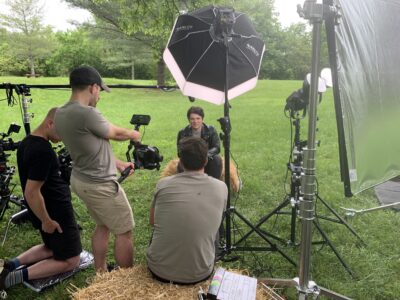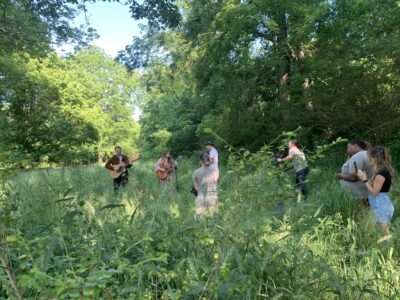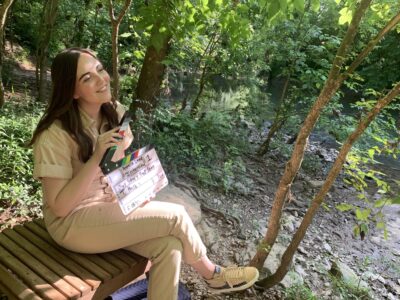Michael Ricks knows a thing or two about survival and you can hear it in every note he plays on his old banjo. There is an undeniable resonance about him — his faith is tried and true and while there are many layers to his story, his songs bring it all together. From “Don’t Let It Get the Best of You,” to “Have Hope,” Michael invites us on a musical journey, following the rhythm of the river, set to the tune of constant resilient hope.
We had a beautiful conversation for Our Story Our Song and because we can’t fit it all into one episode, we’re sharing some of the highlights here. Enjoy this behind the scenes look and make sure to catch the full episode at YouTube.com/RootandVine
In your book From Cult to Country: An Asthmatic’s Journey to Find More Air, you tell the story of your childhood growing up in a cult and how, through music, you managed to find your way out with your faith still intact. How does music factor into your healing and liberation?
The thing that we can’t do is change the past, but we can make the future better. As a musician, what we do is change atmospheres. Designers, painters, artists, that’s what we do, we put beauty in the world. Instead of being resentful, angry, and always fighting with what was, we get to be empowered to do something, to make a difference. We’re stronger than our past.
Being a cult survivor, I could have died many times from medical neglect and not receiving the medication that I needed. I learned very quickly that if you want to survive, you’ve got to focus on the future. I’m living in the present now, now that I’ve dealt with those issues; now that my life is no longer subjected to those toxic beliefs. My life is about the present and the future. The way you get over the past is by changing the present and making the future better.
For me, the therapeutic side of music helped me find my voice. Growing up in the cult, there wasn’t a lot of conversation about feelings between myself, my brothers and sisters, and my parents; there was really no conversation about how we felt individually. I found myself alone with my thoughts a lot. Songwriting helped me put a voice to my internal thoughts, and helped me begin to process my feelings and emotions on paper. Because of that, I discovered that I like to write. Songwriting gave me an outlet, a way to heal and release those emotions in a healthy way.
How and when did you start playing music?
At the age of 12. I had always wanted a guitar and a buddy of mine who lived down the street had a 1960’s TrueTone acoustic guitar. I would often see him and his sisters dragging the guitar through the front yard. So one day, I told him, “Hey, I’ll pay you four bucks for this guitar.” The only problem was if you wanted a little cash, you had to cut grass. In the trailer park, that’s one way to earn money, they pay you five dollars to cut the grass. So I told him, “When I get the four dollars, I’ll pay you for the guitar.”
Well, he went running down to his trailer to get the guitar and my dad came out of the house and said, “Hey, you don’t have the money to buy this guitar. You shouldn’t be making the deal if you don’t have the cash.” Well, he takes four dollar bills out of his pocket, hands them to me. And my buddy came back and gave me the guitar. It had two strings on it. I sat there on this crisscross pine fence under a big pine tree in the front yard of a double wide four bedroom trailer tuning those strings to some semblance of musical intelligence and played and played. Eventually I got my dad to take me in town and get a whole new set of strings.
Did your dad play music?
Yes, my dad played electric bass. My grandmother, she sang in the Fisk Jubilee Singers from one of the first historic black colleges here in Nashville.
That’s quite the legacy. What’s your favorite part of being an artist?
Telling my story through music. I think a lot of artists don’t get to tell their story or maybe neglect their story and don’t realize that the story is greater than the music. I began to connect with a lot of people who, as they heard my story begin to tell their traumatic stories. So often what I would hear is, “Because you told your story, now I feel like I can speak up and talk about what I’ve been through. You’re one of two or three people I’ve ever told in my entire life. I always felt alone, until I heard your story.” I realized that there’s a lot of people around me that don’t feel empowered, and they feel like their struggle or trauma or adversity is trapped in them and they’re by themselves.
As soon as we tell our stories, we figure out we can identify with one another and serve one another. We find out that we’ve actually developed how-tos through survival, and when we share those how-tos, we help each other overcome and make each other stronger.
Do you have a favorite verse in the Bible?
Jeremiah 29:11, “For I know the thoughts that I think toward you, to give you a hope and a good future.” A lot of times people say this weird statement, “Tomorrow’s not promised,” and I’m like, Well, if he says he’s giving you good hope and a good future, I think there’s a promise there.
Is there one word you would use to describe yourself?
Well, it would be very hard to boil it down to one word, but I would say hope. You know, determination, resilience, faith. Because of my story, because of my music, because of what God put in me… I feel like we are God’s voice walking around.
Michael is an artist representative for MAP International. To support MAP’s mission to provide medicine and health supplies to those in need around the world, visit map.org/michaelricks





 Copyright
2024
Root and Vine
Copyright
2024
Root and Vine